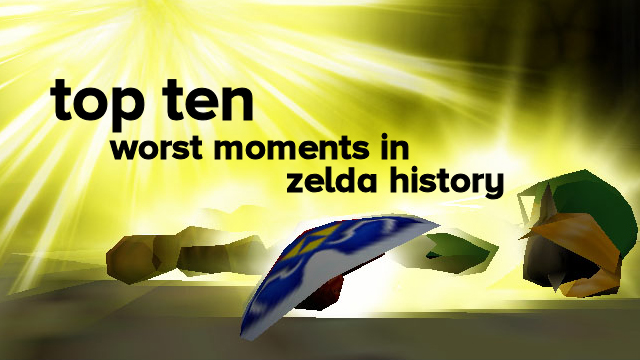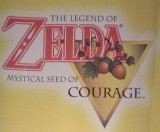
6. Canning the Third Oracle Game

Back in the depths of time, when Game Boy Colour still blew our young minds, there were not two, but three Oracle games in development. We all know the two that made it to the shelves– Oracle of Time and Oracle of Ages— but during development they were known as The Mystical Seed trilogy, with each game covering a “chapter” of the Triforce. The Power chapter eventually became Seasons, the Wisdom chapter became Ages, but there was also meant to be a third Courage chapter that had a colour theme and focused on the goddess Farore. All three games would link together through a password system, but a third game proved just a little too difficult (and costly) to pull off effectively. Thus the two Oracle games we know today were born. Personally, I rather enjoyed these two GBC games and would have loved to have played the third one, but sadly it was not to be (and probably never will be).




 ShareThis
ShareThis







I agree 100% with Phantom Hourglass and The opening to Twilight Princess, as these are the two Zelda games I have played, and never seen to completion. Now that I have my Wii U however, I intend to go back and play Twilight Princess.
Tingle is the subject of my nightmares. I am not sure what Nintendo was thinking here. That said, Windwaker was epic, and easily my favorite Zelda game.
Everytime I try to go back to Phantom hourglass now I get defeated because of my lack of memory of the dungeons and the time limit. I am at the last part of the game too.
I give you props for getting that far. I got to a point where i could not make it through the temple of the ocean king in the time allotted, and i just gave up due to frustration. I must have tried like 20 times. Good luck in finishing it, i wish you the best with it.
I agree with just about all of these except Twilight Princess. I thought its opening was far more enjoyable than Skyward Sword’s. Then again, I think everything in Twilight Princess– minus the sword controls– was better than Skyward Sword. :p
Either way, Nintendo really needs to work out these pacing issues with the next Zelda game, because I don’t think I’ll be able to stand another protracted opening sequence.
I didn’t like Skyward Sword’s opening either, but it was definitely a whole lot better than Twilight Princess’s! XD
I would rank Skyward Sword’s long, unskippable messages every single time you pick up a trinket or buy anything to be far worse than Twilight Princess’s opening.
I’d rank the (awesome) 80s cartoon series worse than either.
Also, Oot3D is one of the _best_ moments in Zelda history. Yes, it’s a to-the-letter remake, but that game is comfort food and now I can play it anywhere, any time.
Oh yes, those item messages were the worst! XD I’d forgotten about them…
Why do people love that ugly as sin Spaceworld demo? I was glad to see that plastic covered piece of filth gone.
i guess that you didnt include the original water temple from ocarina because is a cliche now, but damn it was awful, you are right about the twilight princess intro its pretty boring.another thing i hate is the wind mechanic in wind waker.
And thank your for remind me of the spaceworld demo, i dreamed about a zelda game with that graphics, at that time i thought that demo was the best thing that could happen to my life, i didnt have bandwith but a 56k modem, it took me like an hour to download that 10 second demo, and i watched probably more than 200 times, ah, the good days.
If I’d done an honourable mentions list, the Water Temple would definitely be on there! XD
I think if I was going to rank anything above (below?) those atrocious CD-i games, it would have to be the quest for the Tri-Force pieces in Wind Waker. Granted, it’s been almost a decade since I’ve played that game, but that’s probably the only reason I never will again. A serious flaw in an otherwise perfect game.
Aww, collecting the Triforce pieces wasn’t so bad! I replayed Wind Waker quite recently, and I breezed through that bit with no irritation at all :) I contemplated putting sailing in general on here, but once you’ve got the warp points it really wasn’t all that troublesome in the end.
I’m replaying Twilight Princess on the Game Cube currently and I have to say something in defense of the opening sequences in the game.
Twilight Princess isn’t intended to be a “traditional action” Legend of Zelda game. Like Majora’s Mask, it’s intended to be a “tragic action” Legend of Zelda game and the deliberate pace leading up to the first dungeon is intended to set that up. Link in Twilight Princess isn’t actually a “good” or “heroic” character, but he becomes one through the course of the game through influencing the growth of other characters. When you first meet Link in the game he’s listening quietly to the town “heroic” character talking about “twilight,” the period of time between dusk and dawn where either the sun will set or rise. That entire conversation isn’t about the passing of days. It’s actually about the passing of life. He’s telling Link that -soon- his time will set. This theme pops up frequently as you meet characters based -oddly- on Japanese cultural stereotypes. For example, the mayor of Ordon is intended to reference the religious aspects of Sumo. (Which is why he teaches you it to end a feud between two races. Sumo was -invented- to end a feud between gods and men in Japanese tradition.) But let’s get back to the opening. After this dialogue, the game sets about introducing favorite mechanics from Ocarina of Time: fishing and horse riding, right off the bat. The reason they do this is not purely for fan service. (polls on Ocarina of Time rated those activities as the most enjoyed) It is so they can take them away from the game player very soon afterwards. The game takes a bit of an “into the woods” metaphor in that regard. Just like James Lapine’s “Into the Woods” does with the concept of fairy tale, Twilight Princess does with the concept of a video game. We’re scolded for riding and when we fish, our reward is stolen from us as an act of penance. (The cat is unable to get the fish on its own, thus the selfish idleness of the hero is used to serve a greater good despite of, not because of.)
The traditional “leaving on a journey” storyline from other games is presented and then dashed away in a fit of violence that also shows the “hero” – who is seen as a competent character by the children in the village – to be ineffective when it really matters. The part where you rescue the children at the beginning of the game is intended to be mundane. It’s intended to show “this is what a hero does” to the audience. This is intended to make Link’s inability to protect people much more important to the story later. When Link is dragged into the world between dawn and dusk, he is transformed into a true image of his character. In A Link to the Past, this was a pink bunny rabbit that signified a docile, content, and innocent nature. In Twilight Princess, Link is transformed into a vicious wolf instead. A wolf that can hurt those around him. By transforming Link into a wolf, they complete part of the metaphor set up by Illia. She (Illia) is the “red riding hood” or “moral center” character in the storyline. That is why Link is shown killing her in a later cut scene. The game is making a point about the video game player. The “mundane” aspects of the opening are all the traditional aspects we see in modern video games. Kyogoku, Takano, and Aonuma are making a statement that those things are counter productive or “do not make the player heroic.” This is supported by the fact that people can not really see Link when he is in a wolf form, collecting tears, and -arguably- doing the most significant acts in the game. In fact, the “traditional” dungeon rewards (fused shadows) are shown to be ineffective later in the game. Midna works as a running commentary on the games themes throughout the series and the conversations that Link hears as a wolf are intended to present the anti-hero sentiment even further. The whole point of the opening of Twilight Princess was to set up the storyline and explain -sometimes in very subtle ways- the opening thesis of the game’s philosophical core: that our idea of heroism needs to sunset and grow. Things are not day and night, they are much more complex. The game is showing that it has grown up and changed. Sadly, a lot of gamers did not grow up alongside that theme, which is why it left so many behind.
Also, the whole opening segment (before the event that drags you into the -literal- first mini dungeon as a wolf) can be completed in under 30 minutes if you’re approaching it in a cut & dry manner. If you can’t give a game 30 minutes to introduce mechanics and set a story thesis, the problem isn’t the game…
Eh. That’s my take on the opening of Twilight Princess. As for the rest of the list? Eh. That design on Ganondorf shown makes him look closer to DEMISE, which he is a reincarnation of. Yes, individual string swipes wouldn’t become even more of pain in the butt after the second or third time you mess up. A harp is better suited for the Wii U Game Pad with it’s touch screen than motion plus though. The Ooccoa are hideous. Yes. Ocarina of Time aged badly graphics wise. I’m okay with remastering the game for newer technology. We do frame by frame restorations on movies, restoring games should be a frequent event. The Oracle games were shallow, messy, and awkward. I’m amazed they got two games in a reasonable manner. Three would be beyond their skill level at the time. That Spaceworld demo was neat, but it’s not anywhere near as much of a problem as say… FF7 remake believers. The Temple of the Ocean King is an attempt to do something new. I’m not mad at experimenting with what became a pretty stale piece of bread. A volley mechanic used on less than half a dozen bosses in a series of several score of bosses? OH NO! Trite, petty, and just to fill a list. Those CD-I games are what the creators can point to when “fans” demand full voice in the games. For that reason, I’m glad those things exist. Voice acting is the quickest way to ruin a a good story sometimes.
But yeah. That’s just my opinion.
I actually quite liked the opening to Twilight Princess. I know it was kind of slow and boring, but things do pick up later on and it contrasts nicely with the eventual action the game contains.